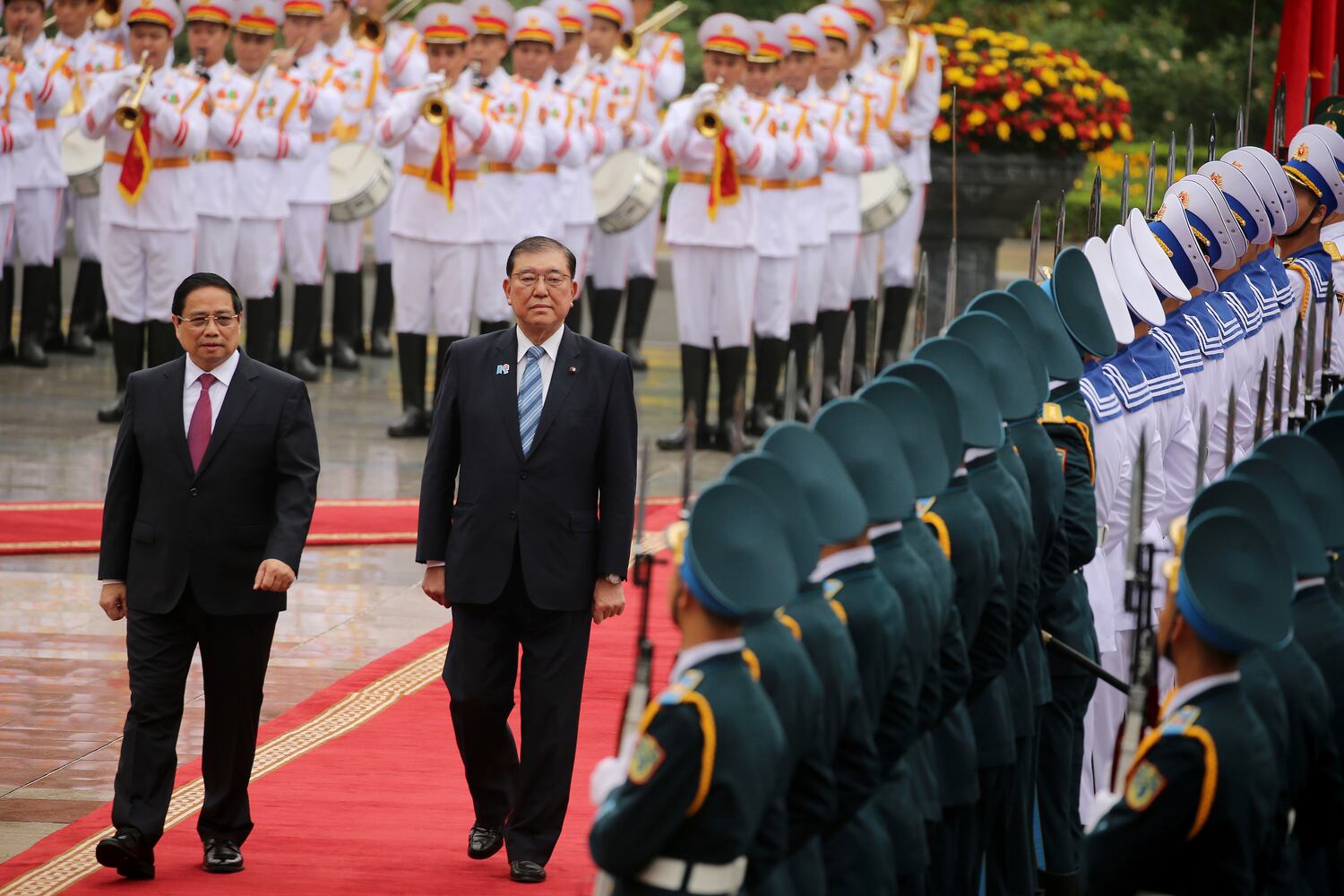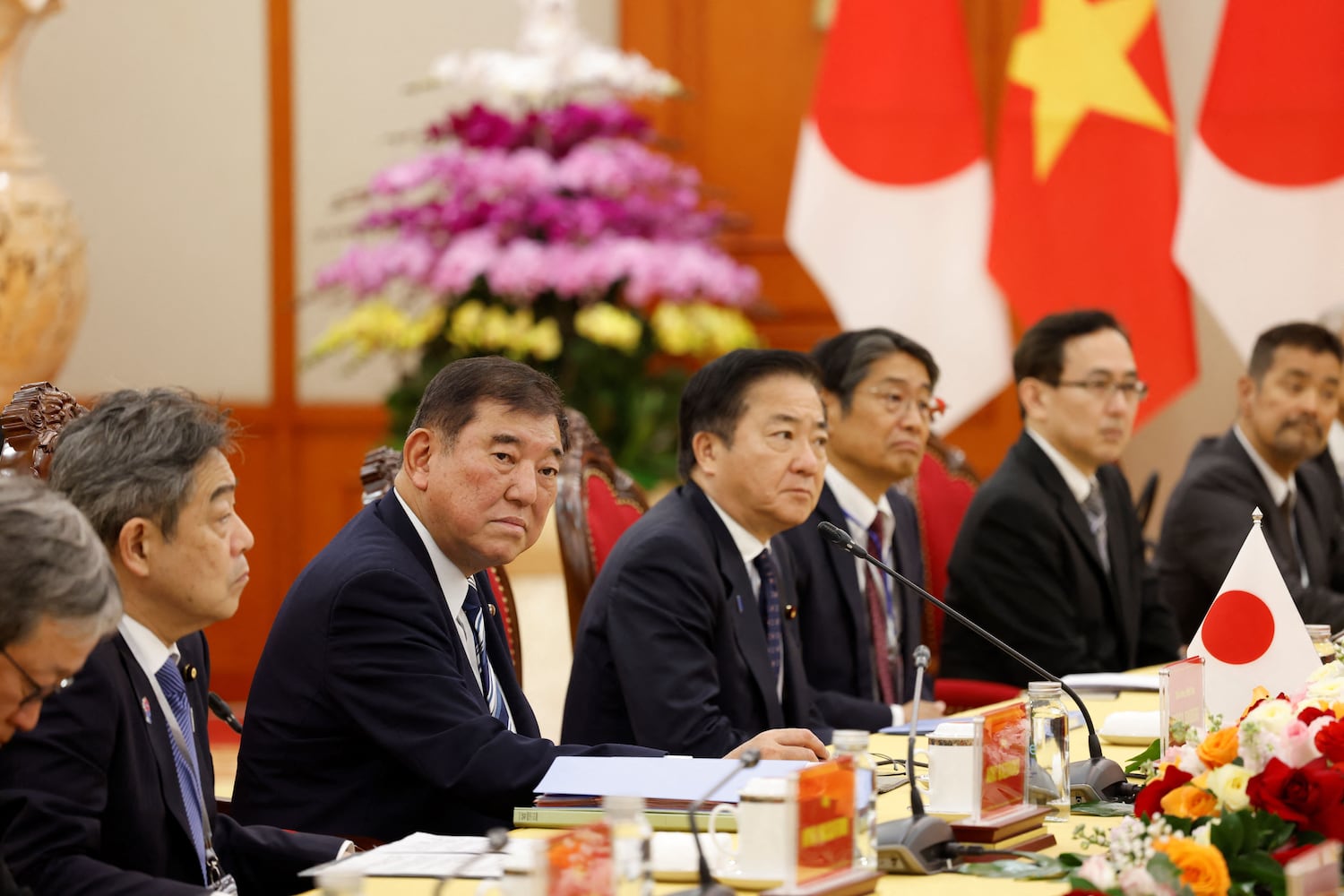UPDATED 28 April, 2025, 09:05 a.m. ET
BANGKOK – Japanese Prime Minister Shigeru Ishiba has been talking up the benefits of free trade, in the face of a China-U.S. tariff war that threatens the global economy, during a meeting with Vietnam’s top leader To Lam in Hanoi.
The Trump administration’s decision to tax Chinese imports 145% and China’s 125% retaliation on U.S. goods has created what Ishiba called “a complex and multifaceted crisis,” in an article for Vietnam’s Tuoi Tre newspaper.
Cooperation between Japan and Vietnam would contribute to regional stability and prosperity, he wrote in the piece published as he arrived in the Vietnamese capital for talks with government leaders.
Ishiba and Lam discussed “the impact of U.S. tariffs and China’s retaliatory actions on the global economy” during a meeting on Sunday, Japan’s foreign ministry said.
Ishiba stressed the importance of “maintaining a free and open international order” as well as international free trade.
But both countries face higher U.S. tariffs – 46% for Vietnam and 24% for Japan – unless they can persuade Washington they will reduce their respective trade surpluses. Pressure to cut U.S. exports is providing a further incentive for both countries to find markets other than America for their goods.
Japan and Vietnam signed a free trade agreement in 2008. Japan was the fourth largest exporter to Vietnam last year, shipping US$21.6 billion of goods. Vietnam sent $24.6 billion worth of products to Japan, also its fourth largest export destination.
Vietnam has also proved an attractive manufacturing base for Japanese companies, some of whom shifted operations from China when the country was hit by heavy U.S. tariffs in 2018 during the first Trump administration.
Around 2,000 Japanese companies have set up operations in Vietnam and Ishiba met executives from some of those firms including Canon, Denso Manufacturing and MHI Aerospace as he toured a Hanoi industrial park Sunday, listening to their concerns about the impact of higher tariffs.
“Ishiba is trying to make the most of the tariff crisis by promoting trade ties that could soften the harm of tariffs, a sensible approach but unlikely to offset the damage that Trump might inflict,” said Jeffrey Kingston, professor of history and Asian studies at Temple University in Tokyo.
“Whatever zigzagging and backpedaling Trump engages in to lessen the problems he created, there is no way to undo the damage he has inflicted and the scars will linger.”
Trump has said that the tariffs are aimed at a revival of American manufacturing, which fell as a share of the economy and employment over several decades of free trade and competition from production in lower-cost countries.
He argues that the threat of double-digit tariffs has brought dozens of trading partners to the negotiating table, offering to lower import duties and non-tariff barriers and buy more U.S. goods.
While building a cushion against a potential hike in U.S. tariffs, Kingston said Ishiba is also “continuing to nurture the security partnerships of [Shinzo] Abe,” Japanese prime minister for two terms and a total of nearly nine years.
“Clearly this is to counter China’s hegemonic ambitions,” Kingston said.
Regional security topped the agenda when Ishiba met with Prime Minister Pham Minh Chinh on Monday.
The two agreed to hold vice-ministerial-level foreign affairs and defense talks, starting this year, according to a joint statement on the talks.
They also pledged to collaborate on defense equipment and technology, and on improving Vietnam’s maritime security abilities.
This could result in Vietnam receiving official security assistance from Japan, which Tokyo established in 2023 “for the benefit of armed forces and other related organizations of like-minded countries.”
Japan wants to “further strengthen security cooperation,” in the face of China’s “unilateral attempts to change the status quo by force,” Kyodo News quoted Ishiba as saying as he boarded the flight to Hanoi.
China and Japan have clashed over China’s claims to the Senkaku, or Diaoyu, islands. Vietnam and China have also faced off over contested territory in the Paracel and Spratly islands, called Xisha and Nansha by Beijing and the Hoang Sa and Truong Sa archipelagos by Hanoi.

But regional defense agreements may do little to control China’s territorial ambitions and may raise tensions with a powerful neighbor, according to Koichi Nakano, Japanese politics professor at Tokyo’s Sophia University.
“The whole security architecture in the region has been designed with the U.S. as the hub and the other countries as spokes, so it would be naive to think that the words will be matched by actual deeds on either side,” he told Radio Free Asia.
“It certainly won’t help with the Japanese defense of Senkaku and might simply irritate China with regards to the problems in Southeast Asia.”
Edited by Taejun Kang and Stephen Wright.
Adds analysis.

